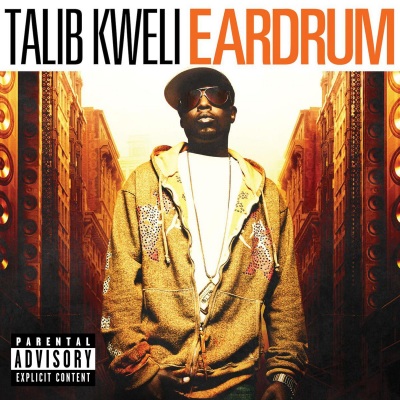
Eardrum
by Marisa BrownAlthough the most salient attribute of hip-hop is the words, the production behind it is equally important. It turns rhymes into song, into something you can feel, something that moves you. And while Talib Kweli certainly has the lyrical aspect down, often his albums -- and to be fair, those of other so-called "conscious MCs" -- tend to suffer from a dearth of good beats. Of course there are still decent tracks, great tracks even, but there's also a lot of filler-sounding material, warm and slow and utterly boring, that deadens the overall flow and power of the album and twists Kweli's powerful vocals into dripping preachiness that lacks oomph behind the pretension and self-indulgence. This same affliction besets Eardrum, the MC's first release on his own Blacksmith label, which, despite its wide selection of producers -- Kanye West, will.i.am, Pete Rock, Just Blaze, Madlib, and Hi-Tek, to name some -- never quite seems to take off, to claim the beat and make it its, and Kweli's, own. The most egregious example of this is in the Afrika Bambaataa-alluding "The Perfect Beat," which sports the worst production on the entire record, simple and cheap-sounding, KRS-One's tired rhymes not helping matters. Nothing else is quite this bad, a lot of it is good in fact, but it is this lack of subtlety, of giving the superlative and then failing to measure up, that bogs down the album. Kweli's trying to single-handedly save rap, practically calling himself its messiah, like in the intro, "Everything Man," where different people talk about the first time they heard him. It's more than a little self-indulgent, but fortunately the MC quickly moves into other territory, discussing social problems, generally those that revolve around poverty ("Eat to Live"), the state of rap and his own place in it ("Listen"), and women ("Hot Thing"). But these are topics that have all been heard before, and perhaps because of that Kweli expands his themes, trying to diversify his rhymes, from the not as catchy "Jesus Walks" ripoff of "Hostile Gospel, Pt. 1" to the tiresome tribute to his children of "Oh My Stars" to the half empowerment, half celebration of a one-night stand (featuring none other than Norah Jones) of "Soon the New Day." Unfortunately, these same moments are also where he seems to be stretching himself too thin, going too far, trying too hard. At 20 tracks and nearly 80 minutes, Eardrum is both too much and too little, never quite understanding exactly what it needs to be. There are certainly strong moments here: Kweli's flow and rhymes are outstanding, and beats by Just Blaze, Hi-Tek, and Kanye West (who, despite his generally abysmal MC skills, comes out with a pretty decent line in "In the Mood": "Only Michael Richards saying, only much blacker/So if he say nigga, then I'm a say -- /Is this a Ritz? Carlton dressed like fresh like just like") are all good, clearly produced by well-practiced and knowledgeable minds, but maybe it's an over-aggrandized sense of purpose, the desire to be and do too much, that keeps the album and the rapper from truly achieving much at all.
